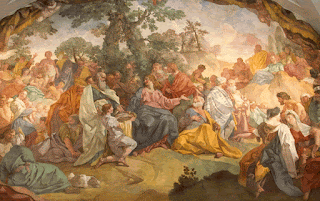One loaf and one cup
Ephesians 4:1-6
St. John 6:1-15
In today's gospel, St. John gives us a subtle hint toward the context of the Feeding of the Five Thousand. In verse four he mentions that "The Passover, a feast of the Jews, was near." (AV) The miracle of the multiplication of loaves and fish draws on Paschal imagery, reminding us of the manna, but also as Christians of Christ's paschal sacrifice for us.
The crowd brings this up in verses 30-31, a not very subtle hint to our Lord, "What sign shewest thou, then, that we may see and believe thee?...Our fathers did eat manna in the desert." (AV) But Christ points the gift of bread back to himself, "The bread of God is that which cometh down from heaven and giveth life to the world...I am the bread of life: he that cometh to me shall never hunger," verse 35.
The feeding of the five thousand is only an image, an illustration, of the Eucharistic feast. One body is broken and multiplied for the life of the whole world. One cup of blood poured out swells into a river which quenches all mankind's thirst. And partaking this one body and this one cup we "participate in the body of Christ," and so "because the loaf is one we, though many, are one body." (I Cor. 10:16-17)
This is the significance of the few loaves becoming food for many. Christ could have, as the Tempter said, "commanded these stones to become bread," and thence fed the crowds (Matt. 4:3). But he did not. He multiplied bread from one source for the multitude. Indicating the unification of Communicants into Christ's flesh and Christ's blood.
And so follows our epistle: "Walk worthily of the vocation wherewith ye are called, with all lowliness and meekness, with longsuffering, forebearing one another in love; Endeavouring to keep the unity of the Spirit in the bond of peace. There is one body, and one spirit, even as ye are called in one hope of your calling; one Lord, one faith, one baptism, one God and Father of all, who is above all, and through all, and in you all." (Ephesians 4:1-6, AV)
The result of our unification in the Eucharist must be walking together with patience and love, without divisions, One as there is only one Baptism and one Faith. This requires great patience and forgiveness on our part. We and our fellow travelers are not yet perfect. Which will inevitably mean that our fellowship together will be fraught with hurt and discomfort and growing pains. But it is the very imitation of Christ to forgive not only the everyday discomfort of living with sinful mankind, but to go to the very Cross saying "Father forgive them." (Luk. 23:34)
St. John 6:1-15
In today's gospel, St. John gives us a subtle hint toward the context of the Feeding of the Five Thousand. In verse four he mentions that "The Passover, a feast of the Jews, was near." (AV) The miracle of the multiplication of loaves and fish draws on Paschal imagery, reminding us of the manna, but also as Christians of Christ's paschal sacrifice for us.
 |
| The multiplication of the loaves and fishes Gregorio Guglielmi |
The crowd brings this up in verses 30-31, a not very subtle hint to our Lord, "What sign shewest thou, then, that we may see and believe thee?...Our fathers did eat manna in the desert." (AV) But Christ points the gift of bread back to himself, "The bread of God is that which cometh down from heaven and giveth life to the world...I am the bread of life: he that cometh to me shall never hunger," verse 35.
The feeding of the five thousand is only an image, an illustration, of the Eucharistic feast. One body is broken and multiplied for the life of the whole world. One cup of blood poured out swells into a river which quenches all mankind's thirst. And partaking this one body and this one cup we "participate in the body of Christ," and so "because the loaf is one we, though many, are one body." (I Cor. 10:16-17)
This is the significance of the few loaves becoming food for many. Christ could have, as the Tempter said, "commanded these stones to become bread," and thence fed the crowds (Matt. 4:3). But he did not. He multiplied bread from one source for the multitude. Indicating the unification of Communicants into Christ's flesh and Christ's blood.
 |
| Coptic Icon of the Last Supper |
And so follows our epistle: "Walk worthily of the vocation wherewith ye are called, with all lowliness and meekness, with longsuffering, forebearing one another in love; Endeavouring to keep the unity of the Spirit in the bond of peace. There is one body, and one spirit, even as ye are called in one hope of your calling; one Lord, one faith, one baptism, one God and Father of all, who is above all, and through all, and in you all." (Ephesians 4:1-6, AV)
The result of our unification in the Eucharist must be walking together with patience and love, without divisions, One as there is only one Baptism and one Faith. This requires great patience and forgiveness on our part. We and our fellow travelers are not yet perfect. Which will inevitably mean that our fellowship together will be fraught with hurt and discomfort and growing pains. But it is the very imitation of Christ to forgive not only the everyday discomfort of living with sinful mankind, but to go to the very Cross saying "Father forgive them." (Luk. 23:34)



Comments
Post a Comment